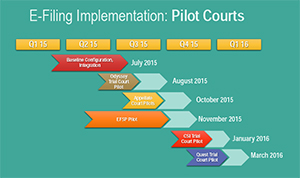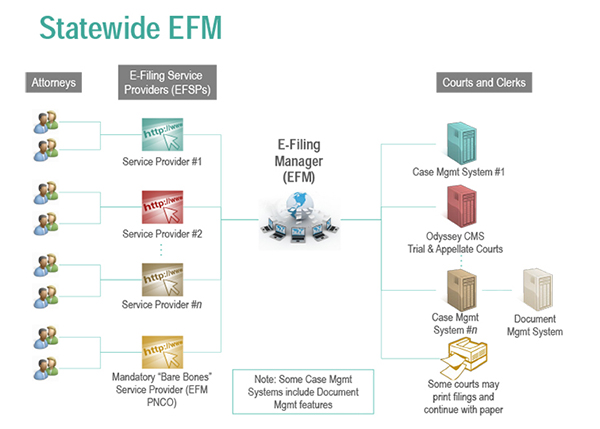In her first State of the Judiciary address earlier this year, Indiana Supreme Court Chief Justice Loretta Rush announced that Indiana courts would begin to offer Electronic Filing (“e-filing”) in 2015 and that “e-filing would transform the way Hoosiers interact with the courts.” With e-filing, two centuries of paper filings will be ending. “Using this technology, our courts will be more efficient and better able to administer justice without delay,” according to Supreme Court Justice Brent Dickson. The Indiana Supreme Court’s Division of State Court Administration (Division) has been tasked to implement an e-filing system that will allow cases to be filed entirely online, reducing the need for costly paper copies and trips to the courthouse.
Following an open and competitive process, Tyler Technologies was selected as the e-filing manager for all Indiana courts. Work began immediately to kick-start the project. There are several case management systems on the court side and the potential for dozens of e-filing service providers on the litigant side. Indiana’s model relies on an e-filing manager to connect them. Litigants, attorneys and law firms will be able to choose their own e-filing provider. The various providers will likely have different costs and features, and some may integrate well with a firm’s existing internal computer system. In addition to commercial e-filing providers that typically charge a fee for service, Indiana’s EFM will provide a basic e-filing service at no cost to attorneys or unrepresented litigants.
How E-filing will work
Here are a few terms that will assist you in understanding how e-filing will work.
- Case Management System (CMS) – computer software that courts use to keep track of case events, documents and parties.
- E-filing service provider (EFSP) – computer software (usually a website) that an attorney or litigant uses to start a case or respond to a case over the internet.
- E-filing manager (EFM)- computer software that serves as the go-between, allowing an e-filing provider to connect to a case management system.
Project Governance
The project is governed by three committees:
- The Executive Steering Committee provides overall guidance on the project and to the other two committees.
- The Technology Management Committee considers the technical needs of the project and makes recommendations to the Steering Committee.
- The Business Management Committee considers the functional needs of courts and attorneys and makes recommendations to the Steering Committee. These committees comprise trial and appellate judges, clerks, public and private attorneys and technology experts.
View list of committee members

Timeline
The judges and clerk in Hamilton County will conduct the initial e-filing pilot for Odyssey courts, which is scheduled to begin in August. The appellate courts will follow in October. The judges and clerk in Wells County, using the CMS called JTS, will pilot in January 2016. During the pilot phases, the Division will work to certify additional EFSPs.
